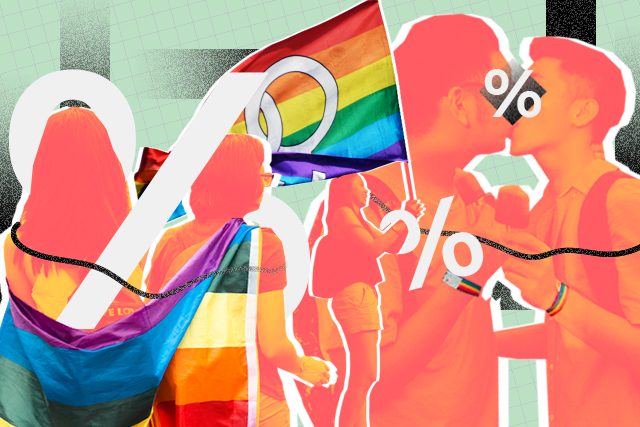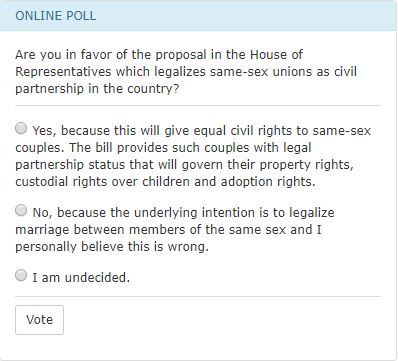
Congress released an online poll about legalizing same-sex union but critics claim the initiative reduces the concerns of the LGBTQ community to something to be voted on.
The poll can be found in the lower house’s website, where Filipinos are asked whether they are in favor of the proposal legalizing same-sex unions as a civil partnership or not.

LGBTQ advocates and supporters have urged Filipinos to vote on the affirmative but there were others who saw the move as “misleading and irresponsible” on the Congress’ part.
LAGABLAB, a network of Filipino LGBTQ organizations, allies and individuals, argued that the issue is much more nuanced than the reasoning provided by the Congress on the website.
“With only seven days remaining for the 17th Congress, it becomes misleading and irresponsible to ask for public opinion on a nuanced issue with such inadequate information and narrow choices,” the network said.
“Our Congress should not decide on our rights solely on the basis of personal opinions or mere online polls,” it added.
A Facebook page ran by an academician and brand marketing consultant reasoned out that “rights should be solely based on brilliant discussion and not just on popularity votes.”
A private Facebook user also shared his sentiments about the poll and claimed that it was “idiotic” of the Congress to simply rely on figures from the online community on such sensitive issues.
— Mabs (@xmabs__) May 21, 2019
“Ang nakataya dito ay karapatan, kaligtasan at buhay ng mga LGBT members laban sa diskriminasyon. There are LGBT members who cannot get jobs because of sexual orientation,” the user wrote.
The proposal being referred to in Congress’ website is the Civil Partnership Act or House Bill 6595 that seeks to give a same-sex couple legal and civil rights like inheritance, child custody, spousal benefits and insurance and retirement benefits.
Specifically, it allows the couple to have the following rights, which were also enumerated by a Facebook user:
- Right to adopt, obtain child custody and provide child support;
- Right to own property;
- Right to obtain insurance, health and pension benefits;
- Right to obtain labor-standard benefits and privileges;
- Right to obtain benefits under tax laws relating to marital status;
- Have the immunity from being compelled to testify against the other and bound by the marital communication privilege;
- Be protected from unlawful or discriminatory employment practices.
The proposed legislation does not require the couple to undergo a “specific religious rite or form” but a “civil partnership ceremony” presided by an administering officer and two witnesses.
LAGABLAB warned that it does not provide “marriage equality” to same-sex couples since it “creates a distinction between married couples and civil partners.”
“It further creates a secondary status for LGBTQI couples — a dangerous consequence at a time when it is still legal to discriminate on the basis of sexual orientation, gender identity, and gender expression,” it said.
Marriage as a human right
Marriage is seen as a human right under the United Nations’ Universal Declaration of Human Rights, specifically under Article 16.
The provision states that “men and women of full age, without any limitation due to race, nationality or religion, have the right to marry and to found a family.”
“They are entitled to equal rights as to marriage, during marriage and at its dissolution,” it added.
Amnesty International, a London-based human rights organization, stated that the provision refers to “both men and women” and not only to a man and a woman in biological terms.
A journal article titled “Marriage: A human right for all?” published on “The Sydney Law Review” also posits that the rights of LGBTQ members are recognized by the United Nations as human rights.
“The rights of transgender people are recognized by the UN as human rights, despite the gender-specific wording of some human rights articles,” it said.
“Any moves towards recognizing marriage equality within international human rights law should extend protection to gender-diverse people as well as people of all sexual orientations,” the journal argued. — Artwork by Interaksyon/Uela Altar-Badayos









